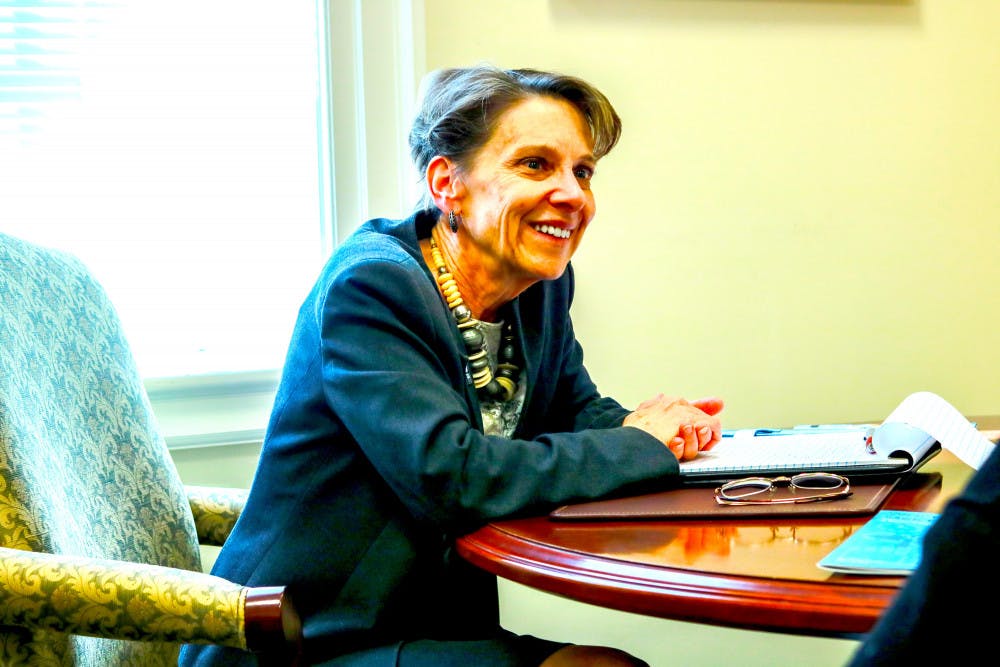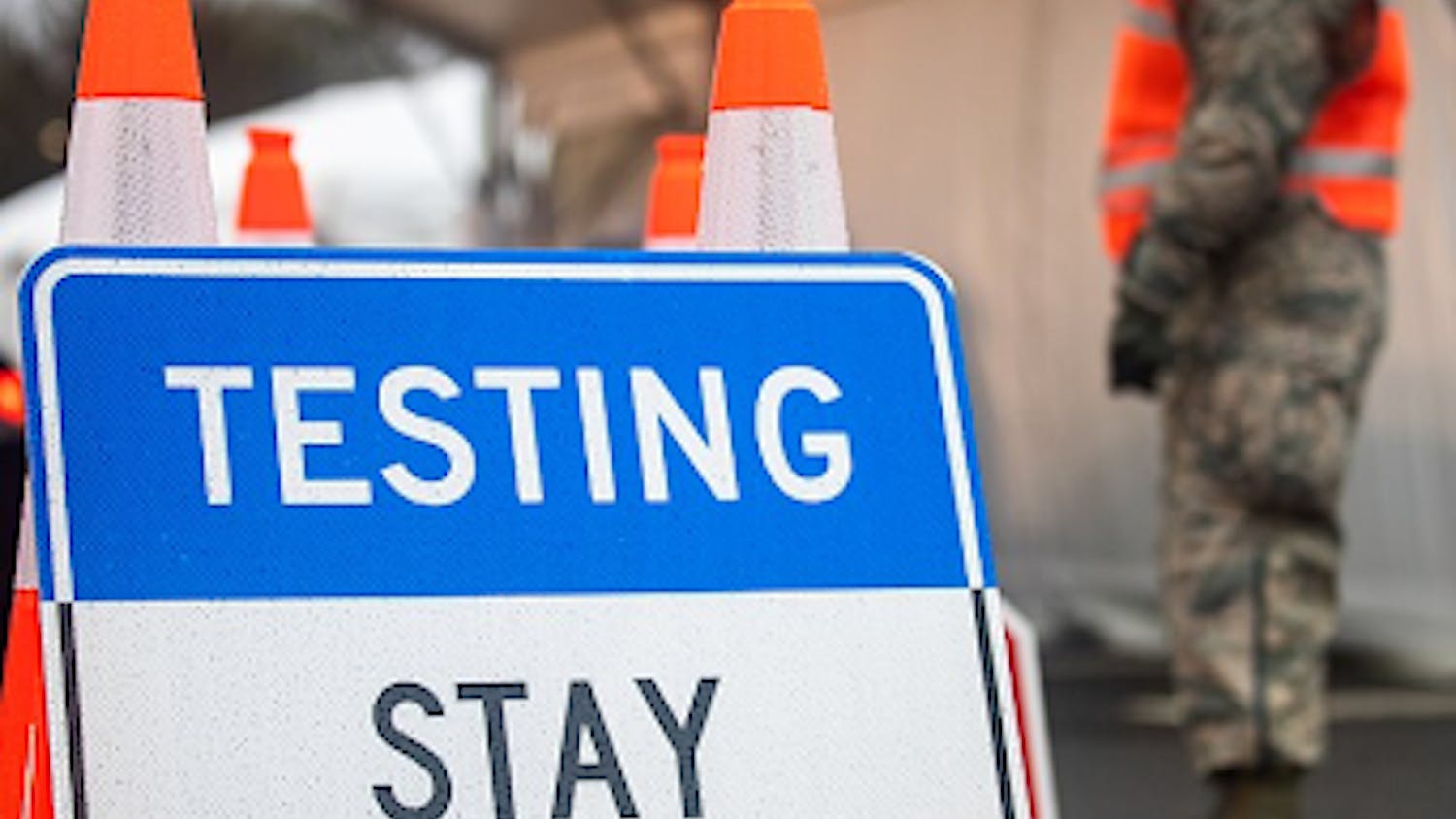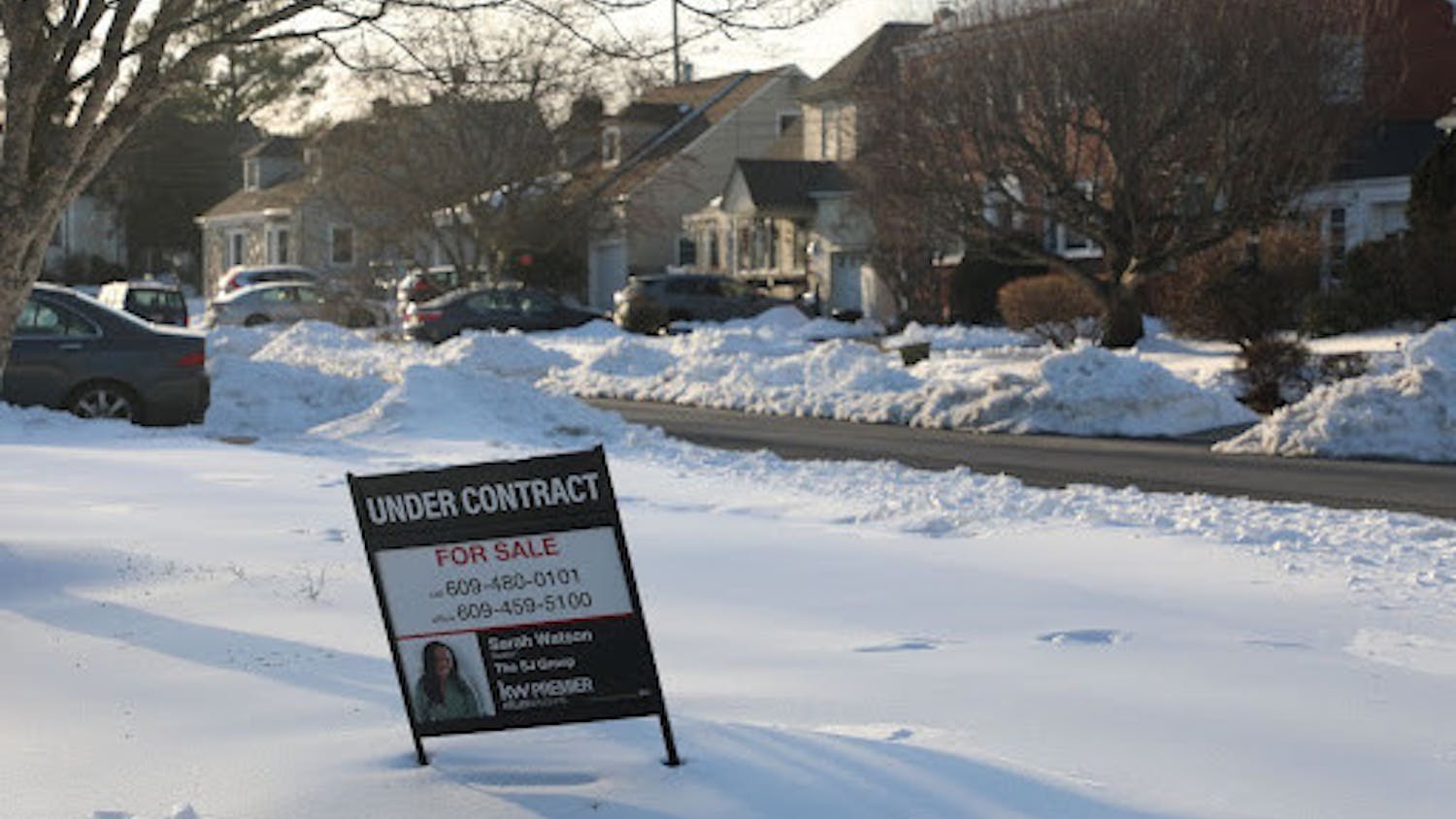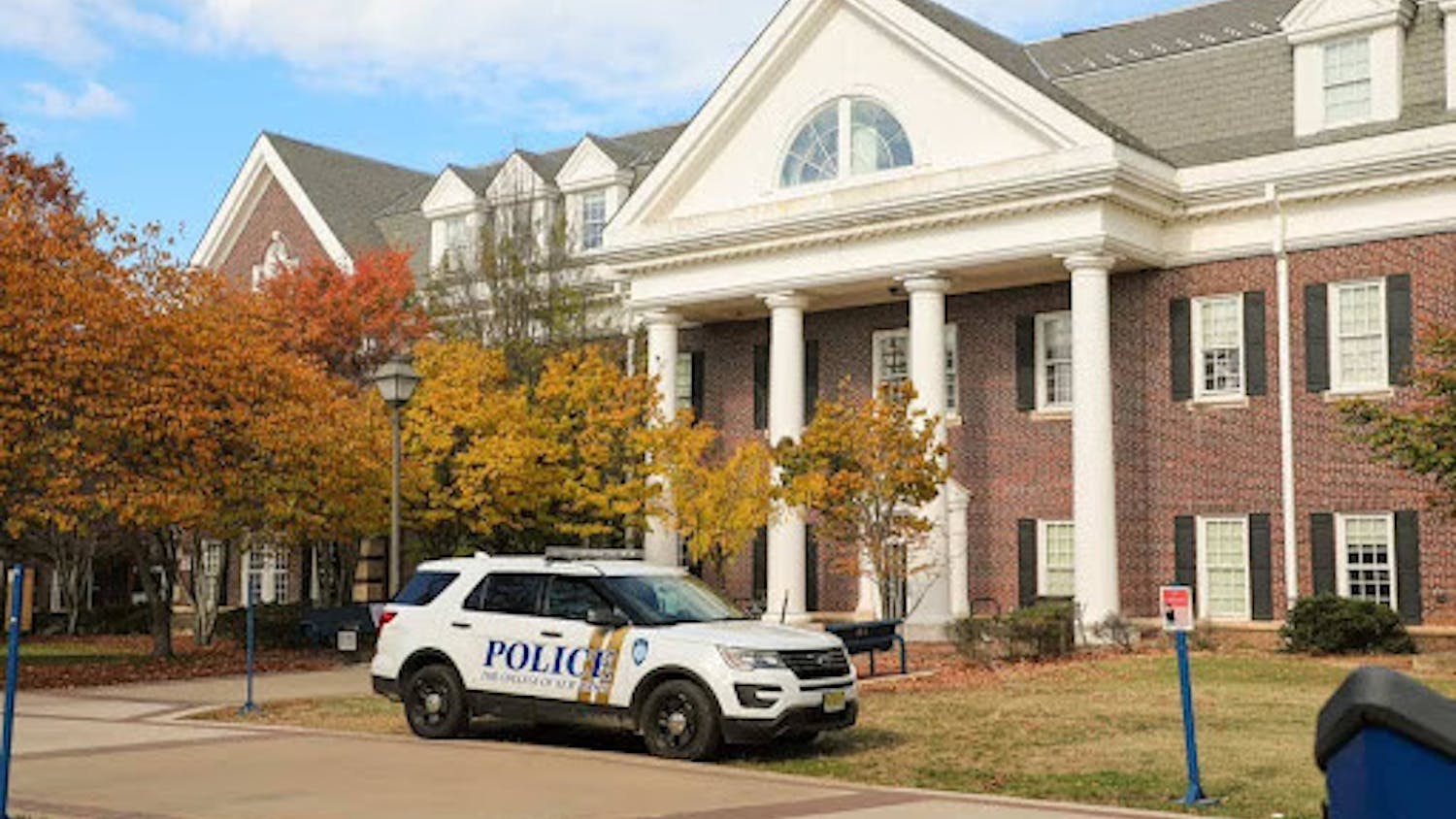By Elizabeth Zakaim
Editor-in-Chief
As the College begins its recovery process from a rather tumultuous year, The Signal sat down with College President Kathryn Foster to assess how she has been processing her first year so far and what her hopes are for the rest of the semester.
While a typical day for the president might involve attending Gov. Phil Murphy’s release of his new plan for higher education –– think closing income inequality and more transparency around financial aid –– or meeting thousands of College alumni from all over the country, Foster has found some time to reflect on the highs and lows of her presidency at the College so far and what she is still looking forward to come in April and May.

For Foster, one of her biggest challenges was the transition from being just a visitor at the College to becoming its leader. This change involved countless meetings with cabinet members, the Board of Trustees and the foundation board –– all of whom help shape the College’s policies, fundraisers and other programming.
The process also includes putting together the budget for the next fiscal year. Foster wants to see the discretionary budget being put to better use in terms of offering more support for disability services, health and wellness and the new division of diversity, equity and inclusion.
An even longer term investment includes renovating the buildings on campus. Armstrong Hall is still in the midst of some necessary touch-ups, and Foster said that the athletics facilities and the residence halls are likely next.
“Our housing stock is old, we know it’s old, it’s been old for a long time,” she said. “They’re tired and need some attention. We’re being responsible for the physical fabric of the campus as well.”
Foster also had much to say about the recent campus controversies that occurred this past year in terms of how the campus has grown and how she is personally healing from those wounds.
Can you share how you’ve been feeling personally about the controversy surrounding the University of Maine at Farmington since the news first broke in January?
It remains difficult because I can’t satisfy the curiosity. These are issues that hit close to home. This is personal to me. You come to those cases as a decision-maker with a sense of the case and although that’s not satisfying for a lot of people because they can’t get details and people are into the details of it, I think it helped people too and helped me to try to say that these are very difficult situations. There’s a whole other deeper backstory that if only I could tell it. But the good news is, if there’s good news and silver linings here, is that it’s enabled us to focus on safety, Title IX, sexual assault, women’s issues ... so I’ve been to (the Women in Learning and Leadership program), I’ve been to women’s and gender studies, I’ve worked with AVI several times –– had them over to the house –– (I’ve) worked with the dean of students. I think that it helped some people to have revealed to them some supports that are on campus and some work that’s been going on. I hope to feel better about it even if they personally had challenges with what had happened in Maine, even without knowing what happened in Maine. My hope for here, there (UMF), everywhere is that we never have so much hubris, or we never have so much certainty or we never have so much sense of ego that we would ever think we couldn’t have done something better as an institution, as a school, as a process, as a policy. I believe that’s happening there and I believe that that catalytic moment has helped us to do that here.
For more information about how UMF is handling its Title IX controversy, see below.
There have been a number of student deaths and suicides this year –– two last semester and two back in February. How have you dealt with this personally and as the College’s leader? What would you say to students who might still be recovering from that tragedy?
I think there’s no more profound loss than a premature loss, and the two in the earlier part of this year were profound losses (and had) ripple effects. I think people have been walking around very sad. I think we’re all somber. We had the Lions’ Hour on loss and grief (on March 8) that everybody, faculty, staff, students, heard about that. How can we possibly look at that and say, ‘was there something more I could have done?’ And I think that’s a really hard place for a campus and for a community and for individuals to hold themselves. I would say that I think one of the things students were concerned about was how we didn’t celebrate or have the big memorials and vigils, and I absolutely understand that reaction. It’s a national best practice and so the College educated me around this as well — it’s very important to not celebrate a death by suicide. Now, what I would say to the campus community about this is, ‘how could we celebrate the lives? Jenna’s life, Charlie’s life –– how could you celebrate that concentrated life that was inside there and make that be something we could do on campus in a way that didn’t perhaps push some people (in terms of suicide contagion)?’ You’re always walking that fine line. Is there a way we could still celebrate a life without it jeopardizing some of the mental health of people who are here, and at the same time learn better so that maybe we feel more confident about it ourselves? How do we see the signs of someone who may be in distress? How could I recognize, in you maybe, that you might be in some kind of pain and at risk for harming yourself or harming others for that matter? We want to do some more intensive programming around that and see if we can do that and a little of it will happen in April (the THRIVE Expo on April 3 and the ‘Out of the Darkness’ suicide prevention walk on April 7) and some of it will happen more in the year to come.
People say, ‘what are you going to do to prevent suicide?’ ‘What are you going to do to prevent sexual assault on campus?’ And the answer is –– that’s not the question. That would be a fool’s errand to imagine that the world will somehow not hit the bubble of (the College) and that what’s out there won’t happen here. Instead I think that, and this the silver lining, by being tested you either affirm, or recommit or double down on the processes. You fix them, or you change policy or you support or shore up the kinds of systems or arrangements you might have. We debrief and we say, ‘OK, what went well and what could we have done better and what are the kinds of additional supports we might need?’
Communication has become a theme for us … you can provide information, or say things, or put them in writing or write articles and you may be perhaps stunned –– I think I was a little stunned –– that people would come up to me and say, ‘well you never told us.’ I’m like, ‘yes we did.’ I think that there’s not one place people go to for information. So, really learning about our audiences and saying, ‘how do parents get information, how do alumni get information, how do friends get information, how does the media get information, how do faculty, staff and students get information?’ You’re always trying to get better at that and you never hit every audience exactly the way they want to be hit. That’s especially true with crisis. Some people aren’t ready for certain messages at a certain time. Others say, ‘Why did you wait so long to give me that message?’ But again, the positive spin –– we have been tested in that way and I hope to always have continuous improvement, you always have to hope that.
Let’s talk about the Landmark crash. How did you first hear about it and what was your reaction?
That was an early morning crash, and so I got probably a text very early in the morning. There’s no other way to hear that news and not be devastated. That’s true of every death you hear about. There’s a protocol and the police are typically involved and certainly were in that case. We have public safety, Campus Police and we also have (resources on campus such as) health and wellness, dean of students –– we have teams that burst into action and we all become as present as possible. The campus usually knows before we do, by the way, let me just be real clear about social media –– many times when I’m hearing something, it’s after it’s already happened or gotten out there.

How did you react when you heard students were boycotting Landmark?
That’s a serious case. The state stepped in on that case. Landmark is not our property. They lease from the private partner that we have. It’s not a TCNJ facility, but that said, we’ve been very involved in discussions around that. There’s a legal side to it. The Alcohol and Beverage Commission has put some new rules on Landmark and those rules changed the hours and the serving that can happen and I imagine that business is down.
The College has announced different initiatives, such as the Bias Response Team, to handle any future racial bias incidents. As President, how involved were you in the implementation of these initiatives? How effective do you think they will be?
So, I called for (the Bias Response Team). It was right after the forum. I also called for a vice president for diversity and inclusion and appointed (Ivonne Cruz) in January. This is a commitment for me, and I think a very important part of my presidency will be breathing energy and accelerating the pace at which we make progress in areas of diversity, equity and inclusion. We can do more –– whether it’s through admissions, whether it’s through enrollment areas, whether it’s through faculty, our hiring committees or our recruitment. I went to the diversity council as well. I talked to them about how do we do an audit of every policy that we have and say, ‘how does it reflect inclusion? How could we identify if there’s inequity built into this? Is the language gendered in a way that will be offensive to some or at least make them feel excluded from that policy?’ We’re doing a top to bottom on this. A lot of policy change takes a long time (but other initiatives happen) a little more quickly.
Looking back at this year so far, what are you most disappointed with and what are you most proud of?
I suppose that because of the disruptions and the stresses and the strains all through the year, I haven’t gotten to know as many people in their natural setting. I haven’t been able to just show up to classes, I haven’t been able be as present as much. What I’m proud of –– the search committee and the people that come on campus and say, ‘take us to the next level and push us. Be a set of fresh eyes on who we are and what we do.’ As an institution, we get complacent –– we get successful and once we’re successful we don’t have to push it anymore, and I’m proud to have been that disruption for the campus. I’m proud to have –– through my presentations or through meetings with the board or through meetings I might have with governance groups or the senate –– I’ve been able to say, ‘but have you considered why we do this and have we thought about doing that?’ (I don’t have all the answers because) I’m new and I can’t know all of the possibilities, but in the meantime I can at least ask those questions. Every time I’m on with the board, I’ve pushed the board a lot. Every time I’m with the cabinet, we push a little. This budget will push a little and we’ll see (if it really reflects) our priorities. I think I’m proud to be that person in my first year. I think we’ve tried to not wallow in the pain of (crisis) but say, ‘what is the opportunity to be better as an institution and as a community?’ I guess we can all be proud of that, I mean other people carry a lot of that, but I think I can be proud of sticking with it.
UMF Controversy –– how students, alumni and administration are handling the aftermath
While the College has been handling a variety of change, UMF is also still dealing with the consequences of its sexual assault case controversies. Current students and alumni at UMF have been reacting to the case and the administration has been creating various initiatives to improve the current campus climate.
Interim President of UMF Eric Brown, who was aware of both Title IX cases before the news broke in the Bangor Daily News, said that since the two cases became public, many more students have stepped forward to speak about their own experiences with sexual assault. He appreciated the bravery amongst those who have made their stories known.
According to Brown, a student activist group called Look Us in the Eyes recently formed at UMF and held a demonstration last month to express concerns about how the campus handles sexual assault cases.

“I listened to every word, and considered every request and recommendation,” Brown said. “It was a powerful event with a number of wrenching personal testimonials.”
Brown said the school is making progress to follow through on the initiatives set back in January, which includes the drafting of an addendum to the Student Conduct Code that requires the president to refer final appeals to a three-person review panel, according to Brown.
Some students and former UMF faculty believe that the methods for handling sexual assault cases were poorly managed.
Tullio Nieman, who graduated from UMF in 1976, has since served as associate dean and director of student activities at Fitchburg State University from 1996 to 2006 and later the dean of students at Endicott College from 2006 to 2008, has been involved in many judicial decisions and appeal boards in higher education. From his experience, he said it would be rare that two similar cases, such as those at UMF, be reversed in such a short period of time and that college presidents would usually have an appeal board reverse a decision rather than take on the responsibility themselves.
“I did not know President Foster personally, so I cannot comment on her performance,” Nieman said. “However I found it surprising that she made the decisions that she did.”
From his experience on judicial boards at Endicott College, Nieman recalled the pressure the board felt to make the right decision. During his involvement with two cases there, the president at the time overturned either the decision made by him and the judicial affairs representative. In his opinion, the president’s decision proved to be a disaster in both scenarios.
He also wondered why Foster remains bound by privacy concerns if one of the victims has come forward and revealed her identity.
“Since the victims have come forward and revealed their names, it would seem that the reluctance for the president to not give more details of her decision making is a bit odd –– she can still honor FERPA (Family Educational Rights and Privacy Act) and discuss the assailants’ names.”
According to the initial BDN article released in January, only the first student came out with her first and last name (Chloe Woodward). The second victim in the article was only identified as, “Sierra.”
Whether atypical or not, Foster and Brown maintain that due to the legalities at hand, she must remain silent about the specifics of the cases –– a situation with which Brown sympathized.
“Kate was the most student-centered president with whom I have ever worked, so I am certain that response has been especially hard,” Brown said. “It is compounded of course by her being unable to discuss her reasoning in the case because of privacy concerns. Rather than focusing on an incomplete picture, I would encourage students to focus on the actions she is taking now and, if possible, speak with her directly.”
Students at UMF feel that while the school needs to improve its handling of Title IX cases, the campus is doing a lot to spark change, and that there is hope for a more improved campus climate.
“I do feel that UMF is making changes,” said Aurora Bartley, a senior English major at UMF. “Part of these changes are beginning with dialogue and talking amongst ourselves, clearing the air and creating a new atmosphere. Talking about the issue of sexual assault and justice is part of the solution.”







